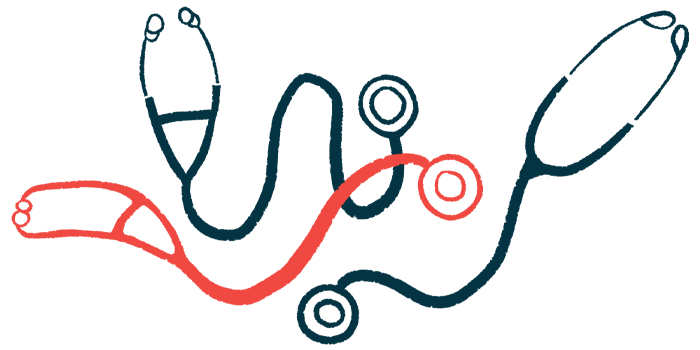Study shows potential of Eko’s AI algorithm for detecting PH
Digital stethoscope records heart sounds for analysis
Written by |

An artificial intelligence (AI)-based algorithm is capable of detecting features of pulmonary hypertension (PH) by analyzing heart sounds recorded with a digital stethoscope, a study found.
Eko Health developed the technology with the help of a $2.7 million National Institutes of Health (NIH) grant.
The algorithm could ultimately help expedite accurate PH diagnoses in primary care or other settings where more invasive and costly diagnostic procedures can’t be easily accessed, enabling patients to start critical PH treatment sooner, according to the company.
“This innovative approach demonstrates how combining digital stethoscopes with advanced AI can lead to a low-cost, non-invasive, point-of-care screening tool for the early detection of pulmonary hypertension,” Gaurav Choudhary, professor and director of cardiovascular research at Brown University in Rhode Island and the study’s lead investigator, said in a company press release. “Our findings represent a significant advancement in clinical practice that can ultimately enhance patient care.”
The study, “Development and Evaluation of a Deep Learning–Based Pulmonary Hypertension Screening Algorithm Using a Digital Stethoscope,” was published in the Journal of the American Heart Association. Four of its authors are employed by or hold stock options in Eko.
Specialized tests required for diagnosis
PH is characterized by elevated pressure in the pulmonary arteries, the vessels that carry blood from the heart to the lungs. This causes symptoms like shortness of breath, fatigue, and weakness, and can eventually lead to heart failure.
It’s usually diagnosed via heart function tests such as echocardiography and right heart catheterization (RHC). Although accurate, these tests are costly and require the expertise of a heart specialist. RHC, the gold standard for confirming a diagnosis, is also invasive.
These limitations can contribute to delayed diagnoses that lead to worse clinical outcomes for patients. Data show that patients can sometimes wait over two years to get the right diagnosis after their symptoms emerge.
“There remains a large, unmet need for a new screening tool that is easily accessible to patients and clinicians, leading to early diagnosis and improved outcomes in patients with PH,” the researchers wrote.
Eko’s screening algorithm relies on information from a noninvasive test called phonocardiography (PCG), which detects sounds and murmurs from the heart. That data is collected using digital stethoscopes marketed by the company.
Data from the noninvasive heart tests are analyzed by an AI algorithm to predict whether the hallmark of PH — elevated pulmonary pressure — is present. The algorithm learns how to make these predictions by analyzing patterns emerging from large datasets, a type of AI called machine learning.
In this case, the algorithm was trained on more than 6,000 PCG recordings paired with corresponding data from standard echocardiogram assessments, which came from a group of 789 people. Another 169,000 PCG recordings without corresponding echocardiograms were also used. After training, the algorithm’s ability to make predictions was tested in a separate group of 196 people.
Results showed that the algorithm could appropriately identify elevated pulmonary artery pressure about 80% of the time. The researchers noted its performance as “acceptable” relative to readings collected via echocardiogram.
The researchers said the approach could mean that doctors who aren’t specialized in cardiac care, such as those in primary care settings, will be able to screen patients. “Furthermore, this approach can improve PH diagnosis and management for medically underserved and rural areas,” they wrote, noting that this may have “powerful implications on global health outcomes.”
Data are still being collected from more than 1,200 patients, which will be used to further refine the algorithm and make more accurate, Eko said.
“Early detection and intervention are essential in addressing cardiovascular diseases, and Eko is dedicated to providing accessible and scalable technologies that empower healthcare providers while improving patient care globally,” said cardiologist Steve Steinhubl, MD, chair of Eko’s scientific advisory board and professor at Purdue University in Indiana.




